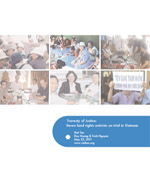May 23, 2011
By Duy Hoang and Trinh Nguyen
Background
Crackdown against social justice activists
In one of the largest crackdowns to date, Vietnamese authorities have targeted land rights activists in the Mekong Delta. According to the Mennonite Church in Vietnam, police interrogated and detained scores of people beginning in the summer of 2010 [1]. Most, but not all, belonged to Mennonite house churches and had homes or farmlands seized by government officials over the years. The individuals had repeatedly petitioned for compensation.
Seven of the protest organizers have been held incommunicado since as early as July 2010 (see profiles) despite requests by family and defense lawyers for access. They will be brought to trial on May 30, 2011 at the People’s Court of Ben Tre Province. In addition, about 40 people have fled to Thailand where they are currently seeking political asylum.
The central figure in this case is Pastor Duong Kim Khai, 52, a long time political prisoner and religious activist. In 2004, authorities seized his home which was being used as an unsanctioned place of worship and jailed him for two years. Upon his release in 2006, Pastor Khai and his family took up residence in a cattle shed of a supporter. He subsequently founded the Mennonite Cattle Shed Congregation, which advocated for religious freedom and social justice.
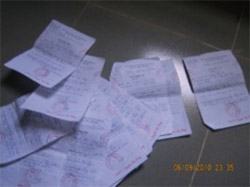
Pastor Khai was assisted by Nguyen Thanh Tam, 58, and Tran Thi Thuy, 40, in helping to organize petitioners. All three are members of Viet Tan [2].
Also detained in the summer of 2010 were fellow land rights activists Pham Van Thong, 49, Nguyen Chi Thanh, 38, and Pham Ngoc Hoa, 57. A seventh defendant, Cao Van Tinh, 37, was arrested in early 2011.
While all seven have engaged in peaceful advocacy, security police have reportedly used violence against some of the defendants and their families. In an interview with Radio Free Asia, the mother of Tran Thi Thuy described how the police beat Thuy’s brother when they came to arrest her [3].
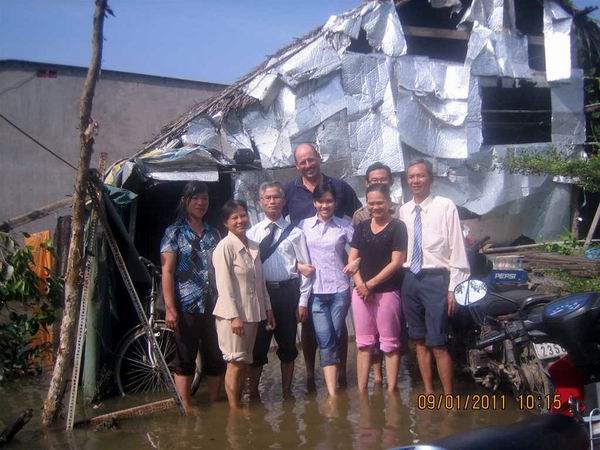
Subversion charges
According to the 1-page arrest warrants, the seven activists stand accused of “attempting to overthrow the socialist government” based on affiliation with Viet Tan, an unsanctioned pro-democracy party.
Since opposition parties are effectively banned in Vietnam, membership or involvement in such organizations is usually considered “subversion” under Article 79 of the Vietnamese Penal Code [4]. In another major case involving Article 79, four members of the Democratic Party of Vietnam were sentenced to long prison terms in December 2009 and January 2010 [5].
Article 79 [6], which carries a maximum penalty of death, has been criticized by international human rights groups as violating freedom of association as guaranteed by the International Covenant on Civil and Political Rights (to which Vietnam is a signatory) [7].
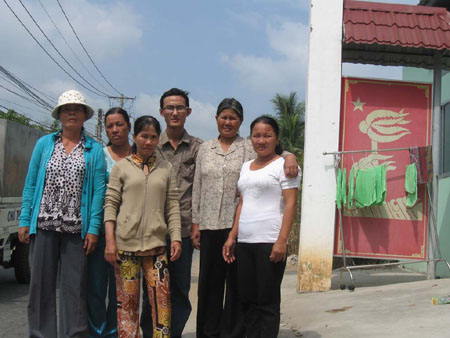
To date, none of the seven defendants have been permitted to meet with a defense lawyer even though most have an attorney arranged by their family. In previous political trials, defense lawyers generally were allowed to meet with their clients only briefly and usually just a few days before trial, if at all.
Aggrieved citizens movement
Known as “aggrieved citizens” (dân oan), a sizable population in Vietnam have been dispossessed of their property over the years. These are typically farmers who have had their lands seized by local government officials to build golf courses, industrial zones or infrastructure projects. The farmers are sometimes promised compensation but in most cases the promised resettlement money is meager or never paid at all.
Many of the farmers are barely literate and have relied on local advocates, often a courageous lawyer or leader of a religious community, to help draft and submit petitions to local government bodies. These petitioners are often ignored and have escalated their demands through peaceful sit-ins outside Communist party and government offices. These sit-ins have taken place locally throughout many of Vietnam’s provinces and at the national level in highly visible demonstrations in Saigon and Hanoi.
Perhaps the most significant demonstration to date occurred in June and July 2007 when up to 2,000 people gathered outside the offices of the National Assembly in Saigon. Coming from 19 provinces, the protesters maintained their sit-in for 27 days [8]. Security officials eventually broke up the vigil and ordered the aggrieved citizens to return home and talk to their local government office. Pastor Duong Kim Khai and several of the individuals who are to be tried on May 30, 2011 actively participated in the 27-day civil disobedience action.
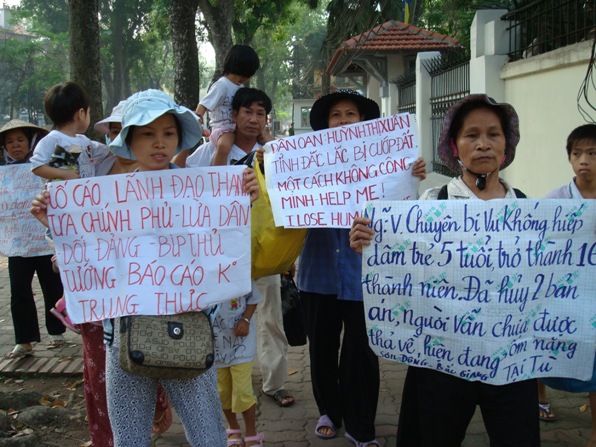
In response to mounting public complaints against government land grabs and corruption, Prime Minister Nguyen Tan Dung issued a decree in 2010 forbidding class action petitions. The new guidelines created a procedural hurdle to limit the ability of aggrieved citizens to collectively seek redress. Instead, each person would have to submit his or her own individual claim. A prominent human rights lawyer, Cu Huy Ha Vu, challenged the legality of this decree by lodging a lawsuit against the Prime Minister. He was subsequently arrested for “anti-state propaganda” [9] and sentenced to seven years imprisonment.
Despite police harassment and official indifference, aggrieved citizens in Vietnam have continued to organize peaceful sit-ins to raise public awareness [10]. Their movement speaks to the challenge of achieving social justice and sustainable development in a country rife with government corruption and unaccountability.
Free Them Now Campaign
Viet Tan initiated an international campaign following the arrest of Pastor Duong Kim Khai, Tran Thi Thuy, Nguyen Thanh Tam and blogger Pham Minh Hoang.
On International Human Rights Day—December 10, 2010—we delivered a petition with over 17,000 signatures to international human rights bodies and the foreign ministries of Australia, Canada, the United States and European governments [11].
Please lend your voice in supporting these courageous social justice advocates. For more information, visit www.viettan.org/freethemnow.
Pastor Duong Kim Khai

![]() Date of birth: June 17, 1958
Date of birth: June 17, 1958
![]() Date of arrest: August 16, 2010
Date of arrest: August 16, 2010
![]() Activities: Pastor in the Mennonite Church of Vietnam, land rights and democracy activist.
Activities: Pastor in the Mennonite Church of Vietnam, land rights and democracy activist.
Duong Kim Khai is a pastor for the Mennonite Church in Vietnam, a long time advocate for aggrieved farmers, a democracy activist, and member of Viet Tan. Pastor Khai truly embodies the religious spirit of which he preaches, living to serve others in spite of his own difficult and crippling hardships.
Born to an impoverished family in Hanoi, he rose from dire beginnings marked with periods of detainment to become a community leader and devoted advocate for the many farmers dispossessed of their lands in the Mekong Delta.
In 1972, he experienced his first brush with police brutality, when the 14 year-old Khai was arrested by security police in Hanoi and underwent a whole night of interrogation.
In July 1985, Khai was detained in Hoa Lo prison for 13 months and endured daily interrogation sessions. Without legal basis for detention, the court placed him in house arrest but Khai successfully petitioned for his release.
By the 1990s in Saigon, Khai devoted himself to his religious faith and was subsequently arrested and detained 13 times, often while trying to organize prayer sessions. From 1999 to 2004, his personal and professional endeavors turned to helping farmers petition local governments for redress.
He started to mobilize followers but without permission to worship, his home became his church, and the parish gathered became a community mobilizing against graft. His home was not only a place of worship, but a community center where farmers, often illiterate, came to seek assistance in petitioning authorities.
The local government, seeking to make an example of him, seized his home and jailed him for two years. Upon his release in 2006, Khai and his family took up residence in a cattle shed of a supporter. He subsequently founded the Mennonite Cattle Shed Congregation, which advocated for religious freedom and social justice.
Pastor Duong Kim Khai was quietly arrested on August 10, 2010 under Article 79 of the Vietnamese penal code. The condition of his health and place of detention was kept from his family by authorities until October 12, when his family received written confirmation of his arrest. The letter from the Ministry of Public Security indicated he was held at “Prison B34” without stating a physical address or how long he would be detained.
Aside from nurturing the spiritual lives of his parishioners, Pastor Khai, for the past 10 years, has dedicated his life to helping the victims of injustice from all faiths in Ben Tre and Dong Thap.
Pastor Khai is married with a 17 year old son. His wife, Mai Thi Dung, suffered a stroke in 2004 and has been confined to bed rest.
Addtionnal profiles

Cao Van Tinh
![]() Date of birth: September 3, 1974
Date of birth: September 3, 1974
![]() Date of arrest: February 22, 2011
Date of arrest: February 22, 2011
![]() Activities: Land rights activist
Activities: Land rights activist
A resident of Can Tho, Tinh has been involved in land rights campaigns since 2001. He participated in the 27-day peaceful sit-in outside government offices in Saigon in 2007.

Nguyen Chi Thanh
![]() Date of birth: May 5, 1973
Date of birth: May 5, 1973
![]() Date of arrest: November 19, 2010
Date of arrest: November 19, 2010
![]() Activities: Evangelist in the Mennonite Church, land rights activist
Activities: Evangelist in the Mennonite Church, land rights activist

Nguyen Thanh Tam
![]() Date of birth: October 10, 1953
Date of birth: October 10, 1953
![]() Date of arrest: July 20, 2010
Date of arrest: July 20, 2010
![]() Activites: Land rights activist
Activites: Land rights activist
Nguyen Thanh Tam is also a victim of expropriation and has resolutely campaigned for justice for himself and many other aggrieved farmers in Ben Tre Province for the last 20 years.

Pham Ngoc Hoa
![]() Date of birth: November 8, 1954
Date of birth: November 8, 1954
![]() Date of arrest: November 19, 2010
Date of arrest: November 19, 2010
![]() Activities: Land rights activist
Activities: Land rights activist
Pham Ngoc Hoa, a merchant by trade, has been a steady presence at sit-ins organized by aggrieved citizens. She helped voice their plight in interviews with international Vietnamese-language radio networks.

Pham Van Thong
![]() Date of birth: June 1, 1962
Date of birth: June 1, 1962
![]() Date of arrest: July 19, 2010
Date of arrest: July 19, 2010
![]() Activities: Evangelist in the Mennonite Church, land rights activist
Activities: Evangelist in the Mennonite Church, land rights activist

Tran Thi Thuy
![]() Date of birth: February 2, 1971
Date of birth: February 2, 1971
![]() Date of arrest: August 16, 2010
Date of arrest: August 16, 2010
![]() Activities: Land rights activist
Activities: Land rights activist
Like many other farmers and merchants in Vietnam, Tran Thi Thuy is a victim of pervasive land expropriation and multiple injustices. For the last 20 years, she devoted herself to championing land rights and actively petitioned for redress, for herself and many other victimized families whose land has been taken away by local government officials in Dong Thap Province.
Her family is often harassed and violently assaulted by the security police and police¬hired criminal gangs. A Hoa Hao Buddhist, Thuy and her fellow temple members are banned to practice their faith and are routinely harassed by the Vietnamese authorities.
Tran Thi Thuy was arrested on August 10, 2010 when members of the Public Security forced their way into her home without producing an arrest warrant. After 10 days of being held incommunicado, her family received a communique informing them of her arrest under Article 79 of the Vietnamese penal code.
Arrest warrants and detention orders
It is common for security police to arrest activists without a written warrant or to require families to keep silent on the detention of their loved one. Families sometimes receive official confirmation weeks or months after an arrest when a written arrest warrant or detention order is provided. Up until trial, defendants are rarely allowed visitation rights from family or defense attorneys. There has never been a case of an activist acquitted of political charges.


